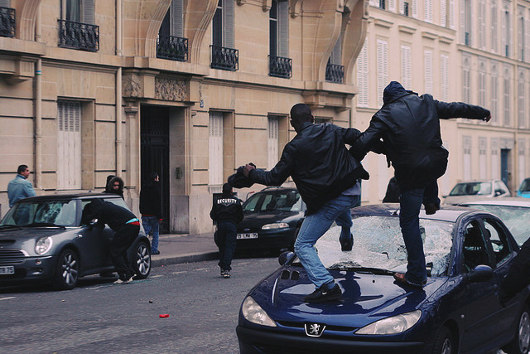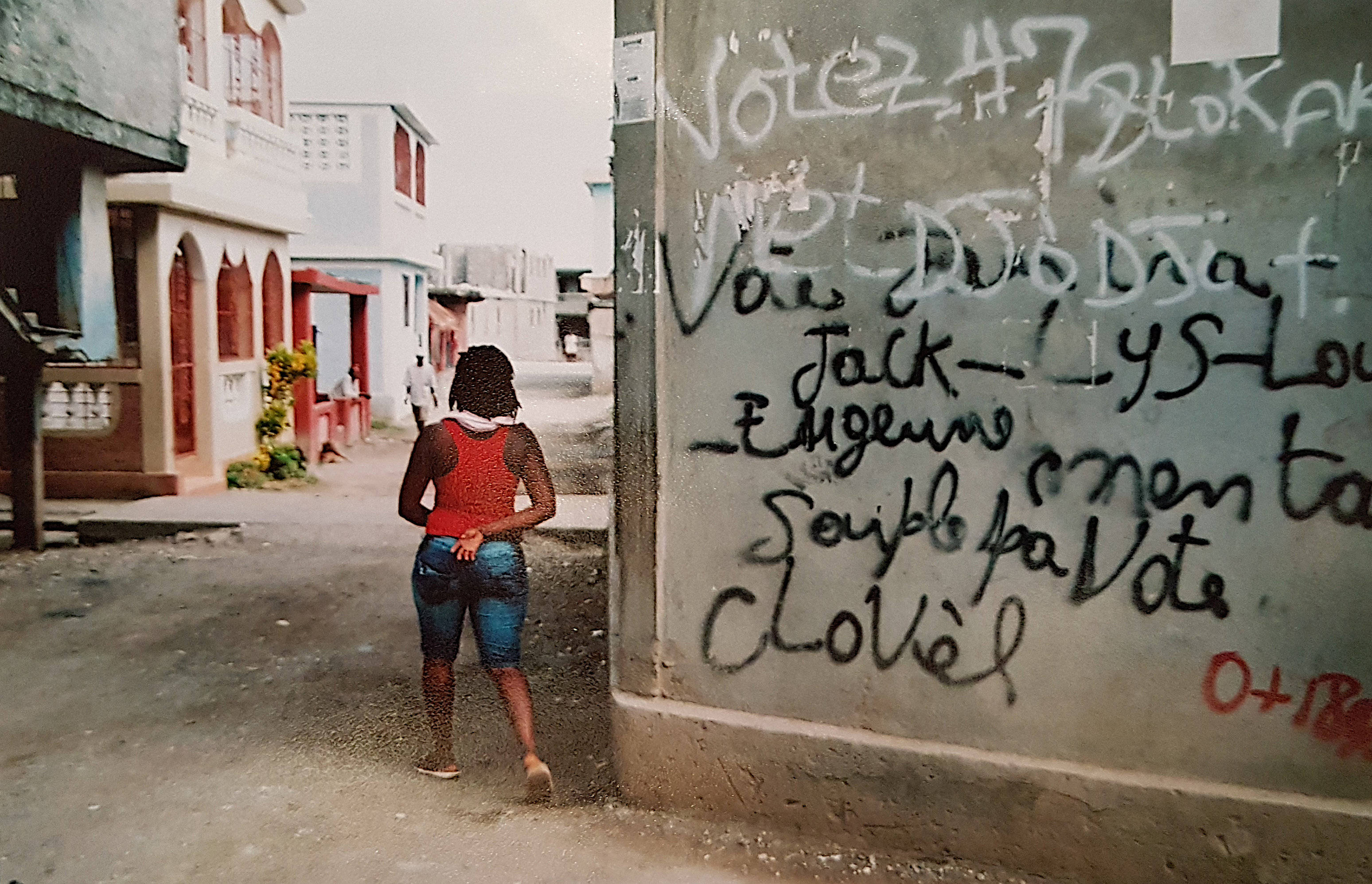055 What ‘Turn the Other Cheek’ Means (and Doesn’t) in an Age of Terrorism
Updated in light of the Westminster attack of March 22, 2017
Picture by Gonzale (Flickr: creative commons)
The horror continues. Islamist-inspired or ISIS-claimed attacks leave us shocked, saddened, grieving for the families who’ve lost or had loved ones injured, and scrambling for solutions to jihadist terrorism. I believe Jesus has something powerful to say to the problem, but his words need to be carefully understood before being applied. This post and podcast was originally published after the Paris attacks of 2015. Sadly, with every new terrorist act, the message still applies.
Listen Now
Two Ways to Respond to Mistreatment
When we’re attacked or mistreated, there are two common ways to respond:
Option one is to get even. The Old Testament allowed for some degree of this, permitting someone to take “eye-for-eye” and “tooth-for-tooth” to get back exactly what was taken from them. Option two is to give in—to let the perpetrator get away with what they’ve done. Jesus addresses these options in his Sermon on the Mount, saying:
You have heard the law that says the punishment must match the injury: ‘An eye for an eye, and a tooth for a tooth.’ But I say, do not resist an evil person! (read his full statement here)
At first, it sounds like Jesus is affirming option two—that we should give up and let the bullies win. He’s not. In fact, he’s giving us an ingenious third option beyond getting even or giving in.
A Third Way
While writing Resilient, my book of reflections on the Sermon on the Mount, I wrestled long and hard with these words of Jesus. The key to their meaning comes in the illustrations Jesus goes on to give:
If someone slaps you on the right cheek, offer the other cheek also. If you are sued in court and your shirt is taken from you, give your coat, too. If a soldier demands that you carry his gear for a mile, carry it two miles. Give to those who ask, and don’t turn away from those who want to borrow.
In Jesus’ day a slap to the cheek wasn’t so much assault but insult. (In a humiliating gesture, it was done with the back of a hand to the right cheek.) To be sued for your shirt meant you were too poor to pay your bills and were now having your very clothes taken from you. And to carry a Roman soldier’s pack was a demeaning task demanded of a Jew. Jesus uses these three humiliating experiences to describe a response to injustice that empowers a victim to respond without retaliating:
- If you’re insulted with a slap, don’t slap back or accept the denigration—surprise the offender by offering your left cheek too. They won’t know what to do, and you’ll show that you’re above repaying the insult.
- If you’re unjustly sued by someone greedy, don’t take revenge or give in—expose their greed by offering them all your clothes!
- And if you’re asked to carry a soldier’s pack, don’t get violent or feel inferior—take charge by going even further than asked.
What Jesus is (and isn’t) Saying
Jesus isn’t saying evil should be rewarded, that self-defense is wrong, or that injustice should be tolerated. What he says is that evil shouldn’t be resisted in equally evil ways. When we’re insulted, humiliated, or face injustice:
Don’t get even.
Don’t give in.
Get creative.
As the apostle Paul puts it: Don’t let evil conquer you, but conquer evil by doing good.
In the Face of Terror
Sentimentality will not help us fight terrorism. As touching as this video of a father soothing his son over the Paris attacks was, we kid ourselves believing ‘flowers and candles’ will ‘protect’ us from such atrocities. And when would-be activist-types glibly declare on social media that ‘nonviolence’ is the solution to terrorism (often whilst far from any violence themselves), it can be sentimentality speaking. (It’s sobering to note that Andrew White, the vicar of Baghdad, who has paid heavily working for peace in Iraq, called for troops to be sent in to combat ISIS.)
Few of us are sufficiently informed about the realities of terrorism to boldly state what should be done to counter it. The situation is a complex mess of ideology, culture, warped religion, retaliation over past events, and pure evil. I’m not going to join the chorus of ‘solutions’ being offered. That’s far above my pay grade. But as a follower of Jesus, here’s what I’m contemplating in light of his call to ‘turn the other cheek’ and not fight evil with evil.
1. If we are to be faithful to Jesus, we must deal with truth, not error. There is much fear mongering going around through articles like this that exaggerate for political ends. The facts are not always easy to confirm but stick to reputable media reporting, not the propaganda of fringe alarmists on various sides of the issue.
2. If we are to be faithful to Jesus, we must renounce revenge. Any force used must be to save innocent lives and restrain evil, not pay the terrorists, their country, or their religion back. The repugnant comments on the article I’ve mentioned above are far short of Jesus’ words and way.
3. If we are to be faithful to Jesus, prayerful, imaginative response is required. We are not to surrender or acquiesce, but do creative, surprising acts to interrupt the cycle of violence. Retaliation is easy. This is hard work requiring prayer, study and creativity.
4. If we are to be faithful to Jesus, we must be clear who the enemy is. In this case it is ISIS and other jihadist terrorists, not Syrian refugees (refusing asylum to these victims of war because a few terrorists have hidden among them is to mete out cruelty upon cruelty) or Muslims in general (blaming all Muslims for Islamic terrorism is like blaming all Christians for the hate rallies of Westboro Baptist). When we confuse this we can play into the terrorists’ hands. As Australian peace activist Jarrod McKenna has said: “ISIS wants you to hate Muslims. It’s their best tool for recruitment. Don’t let ISIS win. Love your Muslim neighbour.”
5. If we are to be faithful to Jesus, we are to love our enemy. This is where Jesus goes next with his ‘turn the other cheek’ idea, telling us to pray for them, meet their physical needs, and show them kindness. We may think this naive but as the number of Muslims having visions of Jesus suggests, and stories like former KKK leader Johnny Lee Clary’s transformation (forward 22-minutes into the video), prayer and kindness are powerful weapons.
Some question whether Jesus’ call for nonviolence can be applied to nation states. It’s a good question. We need to keep in mind that Jesus originally gave these directives to people under Roman occupation, and the Romans could resort to terrorism (crucifixion anyone?) to enforce their rule. Jesus was giving his followers tools to respond to organised evil. And both Gandhi and Martin Luther King Jr demonstrated what can happen when one applies them beyond interpersonal relationships.
We cannot be naive. Islamic terrorism is very real and western countries are its target. Scripture affirms the role of governments to enforce order for the safety of its citizens, and every support should be given to authorities to track down each culprit and those that support them. But the history of the world shows that violence begets violence, and Christians are called to live differently. ‘Bomb them!’, ‘Kill them!’, ‘Deport all Muslims and shut the door on refugees!’ is not a Christian response. Remember:
Don’t get even.
Don’t give in.
Get creative.
Don’t conquer evil with more evil. Conquer it with good.






hodge publishing
Hi Sheridan, Like many of us, you’ve obviously been thinking around the Christian response to Friday’s horror. Like me, you have seen the flowers and candles for what they are … emotions poured out, what is called ‘knee-jerk’ even though we see, of course we see, that people have a need to respond and this has become a popularly understood way. You’ve come up with a lot of stuff here which is sending me back to my less than so adequate musings which haven’t hit the blog yet – shall read and think if I have any thoughts which I may adjust at all in the light of your thoughts – not to copy, or because mine are ‘not the same and therefore wrong’ – but just to see how much your piece clarifies my own thoughts on this, and improves my articularity (which I think may be a word?) Thanks for posting.
Sheridan Voysey
The issue is so large one post and podcast like this won’t cover all its facets, so reflect, adjust and write more.
Tanya Marlow
Love this – especially the thoughts about creative non-violent responses. I’m increasingly wondering about how this might work out.
Sheridan Voysey
More and more I think artists and performers of deep faith need to be involved in the strategy-making process…
Dave
If a house is divided against itself, that house cannot stand.
Then any future attacks will change our passive thinking on what it means to be a Citizen of a Nation. Its ludicrous to have members that benefit from democracy, being literally ” hell bent” on its destruction.
Stephen Davis
James 2:13 For judgment is without mercy to him who has shown no mercy. Mercy triumphs over judgment….. 🙂 …..cunning as serpents yet harmless as doves because a wolf is not a lamb…. 🙂 ….and grace always…… 🙂 …..
Tania Harris
Excellent podcast Sheridan. Insightful, considered, godly. Just did a radio interview based on message of the book of Revelation rather than Beatitudes but with the same sentiments (make sense since it is the same Jesus!) SO good to hear Christian voices speak wisdom on this topic and lead the way in modelling humble, gracious and Jesus-like responses. Thank you!
Brian Mitchell
Thank you for your insight and something more for me to think about.
The following is an excerpt from an article I read recently…I hope this is not too political.
>>>Radical Islam, for example, is a highly potent mixture of motifs drawn from the Muslim past and Marxist-Leninist ideas imported through the writings of such polemicists as Sayyid Qutb and Abul Ala Maududi. The two most ambitious and powerful Islamist groups — the Islamic State and al Qaeda — do not seriously believe that their acts of terrorism against the West will lead the EU or the United States to surrender.
Their strategy is more patient and indirect (a Marxist would call it dialectical). They want their attacks to provoke a far-right anti-Muslim backlash within Western countries that will in turn inspire persecuted Muslims within those countries to become radicalized and willing to undertake ever-more spectacular attacks against their host societies. Attack, crackdown, worse attack, more draconian crackdown, on and on, with the West eventually weakening enough that a resurgent Islam can rise as a triumphant global power.
Make things worse to make things better: a classic case of heightening the contradictions.>>> end of excerpt.
The way we react (verbally and physically) is being used against us.
We are not only dealing with Radical Islamic groups either but also there is a rise in extreme left political groups (Marxist/Socialist/Communist) who are doing their best to tear apart western culture and also want global power.
The second paragraph above is also very relevant to these political groups in how they are using the reactions of those who oppose their views to push their agenda. The whole Equal Rights issue is of huge concern right now to the point where those who support traditional values are being discriminated against.
Young adults just want to enjoy life in their younger years and don’t want to hear about or deal with what’s happening around them. In general they are confused and don’t know who or what to believe. My heart goes out to them.
Matt McChlery
Thanks Sheridan. Some thought provoking insights on a difficult and extremely relevant topic.
Denis
Thanks for such carefully considered insights.
However a question keeps popping into my mind repeatedly: As a regular citizen not tasked with law enforcement, if I was in a position to shoot and kill this attacker that day should I have done so? Further, if I didnt do so would I have been atleast partially responsible for the deaths of the people he subsequently murdered?